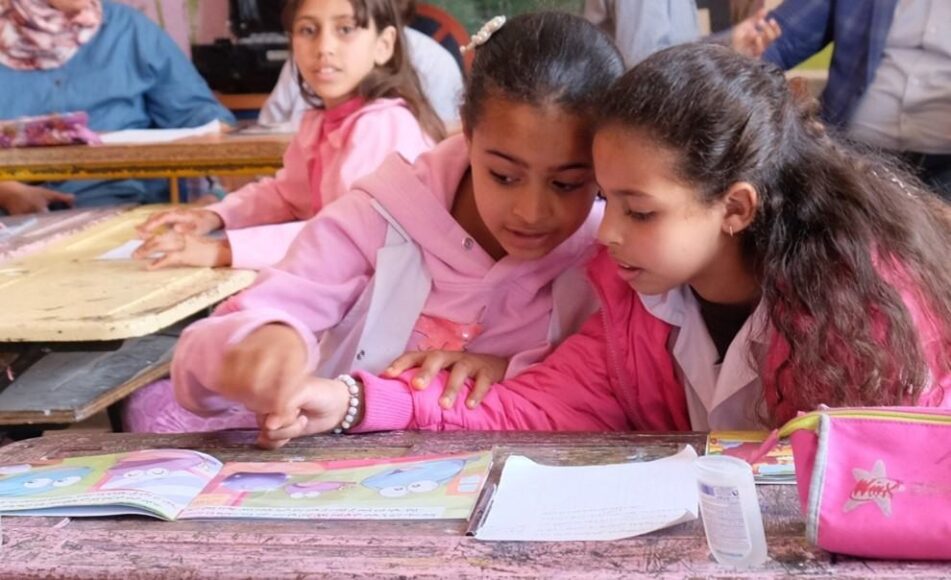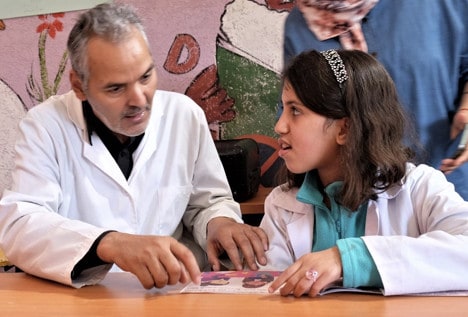
Khaoula El Mouhib used to be too shy to read in front of her classmates. She has autism and struggled to decipher text and pronounce the words. But on a recent sunny day at her grade school in Kenitra, Morocco, the 10-year-old is beaming brightly as she tells the class about the colorful booklet she chose from the classroom’s reading corner.
As she recounts the story of a man so wealthy, he used a new spoon for every bite, Khaoula smiles and speaks proudly.
“Very good job!” says her teacher, Abdellatif Ryany, who then calls on the next student.
The lively and accessible booklets are one element of a comprehensive program to improve literacy from the earliest grades in Morocco. Funded by the U.S. Agency for International Development in partnership with the government of Morocco, the Reading for Success–National Program for Reading (RFS-NPR) is inspiring a love for reading among young students in Morocco and actively engaging teachers and administrators at the ground level.
In the spirit of World Book Day 2021, Creative Associates and its partners in the Moroccan Ministry of Education reflected on the energizing effect of giving children space to choose their own reading material in the classroom.

The beauty of books
The RFS-NPR program overhauled the reading curriculum and textbooks for elementary schools starting in 2017. But required readings alone cannot ignite a passion for learning for all types of learners. Reading materials typically available in Moroccan schools lacked variety and fun.
Based on materials from the Asafeer Digital Library, the program gathered 100 supplementary reading materials in sets that students can choose from. The USAID program worked closely with Morocco’s Ministry of Education and reading experts in 2019 to adapt the materials to the Moroccan context, ensuring gender equality and social inclusion and increasing representation of people with disabilities.
Copies were printed and delivered to 63 pilot schools. The books are also available online through the Asafeer website so students can extend their reading outside school while teachers track their progress.
Compared to traditional required readings, the new reading materials are more lighthearted in tone and feature more illustrations. Teachers in the pilot schools readily adopted the free-reading approach, saying the attractive materials and the element of choice have transformed more students into independent readers.
“They have helped students improve their linguistic skills,” says Khaoula’s teacher Abellatif Ryany. “Now they read more fluently, learn new vocabulary, and they feel free because they choose the stories themselves.”
The level of positive feedback from students and teachers inspired the Ministry of Education to take the unusual step of changing the official school schedule mid-year to devote 30 additional minutes per week to reading.
These readings are especially encouraging to students who are challenged in understanding text, like Khaoula.
“Before Khaoula started reading these stories, she wasn’t as fluent in reading. She was shy and wouldn’t read aloud even a sentence,” says Khaoula’s mother, Essmahan Echen. “Now Khaoula reads every day a new story,” Echen continues. “She doesn’t stop reading at home. She learned new vocabulary. Her pronunciation improved so much, and she pays more attention to saying the words correctly. She is more open to the outer world. She loves reading more than ever.”
“I love reading these stories every day,” Khaoula says. “I know them all by heart.”
Mounya El Asri provided programmatic support for this article.